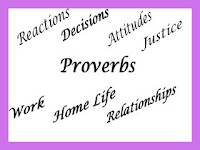 Today we start our study on Chapter 4 of Proverbs. We will cover the first four verses of this new chapter. Here they are:
Today we start our study on Chapter 4 of Proverbs. We will cover the first four verses of this new chapter. Here they are:Proverbs 4 (NKJV)
Security in Wisdom
1 Hear, my children, the instruction of a father,
And give attention to know understanding;
2 For I give you good doctrine:
Do not forsake my law.
3 When I was my father’s son,
Tender and the only one in the sight of my mother,
4 He also taught me, and said to me: “
Let your heart retain my words;
Keep my commands, and live.
 Verse 1 of this chapter starts out with Solomon speaking to his sons, and trying to pass on some of his wisdom. Remember that God had promised this man that he would be the wisest man to ever live, so it would have been a good idea for his sons to have listened to him. Unfortunately, if you read his life story, you will find out that mostly, they didn’t listen to him. It is also interesting to note that King Solomon didn’t always do what he preached either, and he ended up having a lot of problems in his own life because of this.
Verse 1 of this chapter starts out with Solomon speaking to his sons, and trying to pass on some of his wisdom. Remember that God had promised this man that he would be the wisest man to ever live, so it would have been a good idea for his sons to have listened to him. Unfortunately, if you read his life story, you will find out that mostly, they didn’t listen to him. It is also interesting to note that King Solomon didn’t always do what he preached either, and he ended up having a lot of problems in his own life because of this.
 He tells his sons to give their attention to his instruction if they want to come to a point of understanding. When we hear/read something from God’s word, we need to pay attention and “digest” it. We need to “take it into ourselves” and make it a part of our life.
He tells his sons to give their attention to his instruction if they want to come to a point of understanding. When we hear/read something from God’s word, we need to pay attention and “digest” it. We need to “take it into ourselves” and make it a part of our life.
James 1:23-25  says:
says:
23Anyone who listens to the word but does not do what it says is like a man who looks at his face in a mirror 24and, after looking at himself, goes away and immediately forgets what he looks like. 25But the man who looks intently into the perfect law that gives freedom, and continues to do this, not forgetting what he has heard, but doing it—he will be blessed in what he does.
 Solomon goes on in the second verse to say that he is passing on “good doctrine” and that they shouldn’t forsake, or turn away from, the law. “Doctrine” is defined as: 1. A principle or body of principles presented for acceptance or belief, as by a religious, political, scientific, or philosophic group; 2. A rule or principle of law, especially when established by precedent. 3. Archaic: Something taught; a teaching.
Solomon goes on in the second verse to say that he is passing on “good doctrine” and that they shouldn’t forsake, or turn away from, the law. “Doctrine” is defined as: 1. A principle or body of principles presented for acceptance or belief, as by a religious, political, scientific, or philosophic group; 2. A rule or principle of law, especially when established by precedent. 3. Archaic: Something taught; a teaching. By writing down these proverbs, Solomon was trying to pass on teachings that were based on a body of principles handed down from God. These were based on precedents that he had learned through the gift of wisdom that he had received from God.
 Verses 3 and 4 tell us that Solomon had listened to his father, King David, and learned from him and from his mother, Bathsheba, as well. He had “honored his father and his mother…” which is a commandment that comes with a promise. Exodus 20:12 "Honor your father and your mother, so that you may live long in the land the LORD your God is giving you.”
Verses 3 and 4 tell us that Solomon had listened to his father, King David, and learned from him and from his mother, Bathsheba, as well. He had “honored his father and his mother…” which is a commandment that comes with a promise. Exodus 20:12 "Honor your father and your mother, so that you may live long in the land the LORD your God is giving you.”
 Solomon goes on to say that David had told him that if HE put the words that he was taught into his heart and life, then they would bring life. Solomon was blessed to have been very close to his father, a very Godly man, and he gained a lot of his wisdom from that relationship. There are many stories of people in the Bible that had Godly parents. They followed in their parents footsteps, staying close to God, and He was able to use them in marvelous ways.
Solomon goes on to say that David had told him that if HE put the words that he was taught into his heart and life, then they would bring life. Solomon was blessed to have been very close to his father, a very Godly man, and he gained a lot of his wisdom from that relationship. There are many stories of people in the Bible that had Godly parents. They followed in their parents footsteps, staying close to God, and He was able to use them in marvelous ways.
 We must always remember that we are models to children and to other people that are watching us, and that we can either pass on good principles, or evil ones. We can’t say “Do as I say, and not as I do,” for it doesn’t work!
We must always remember that we are models to children and to other people that are watching us, and that we can either pass on good principles, or evil ones. We can’t say “Do as I say, and not as I do,” for it doesn’t work!
 If you had Godly parents or a Godly parent, Praise God for your blessings, and if you didn’t have an “EARTHLY” Godly parent/s, then Praise God that HE promises to be your father and to love you and teach you in HIS way that ultimately brings peace, love and joy into your life.
If you had Godly parents or a Godly parent, Praise God for your blessings, and if you didn’t have an “EARTHLY” Godly parent/s, then Praise God that HE promises to be your father and to love you and teach you in HIS way that ultimately brings peace, love and joy into your life.
 Today we will be looking at verses 10 through 22 of chapter 4. Most of these verses simply state in different words, the same things that we have studied in the first couple of chapters of this book. I think that they are pretty self explanatory after the word studies we have done before. Let’s read the verses.
Today we will be looking at verses 10 through 22 of chapter 4. Most of these verses simply state in different words, the same things that we have studied in the first couple of chapters of this book. I think that they are pretty self explanatory after the word studies we have done before. Let’s read the verses.
 14 Do not enter the path of the wicked,
14 Do not enter the path of the wicked,  18 But the path of the just is like the shining sun, (literally – light)
18 But the path of the just is like the shining sun, (literally – light) Incline your ear to my sayings.
Incline your ear to my sayings. 


















































